‘Industrials for Christ' brings together professionals and amateurs from the construction sector to reform Christian facilities and to help unbelievers know Christ better.
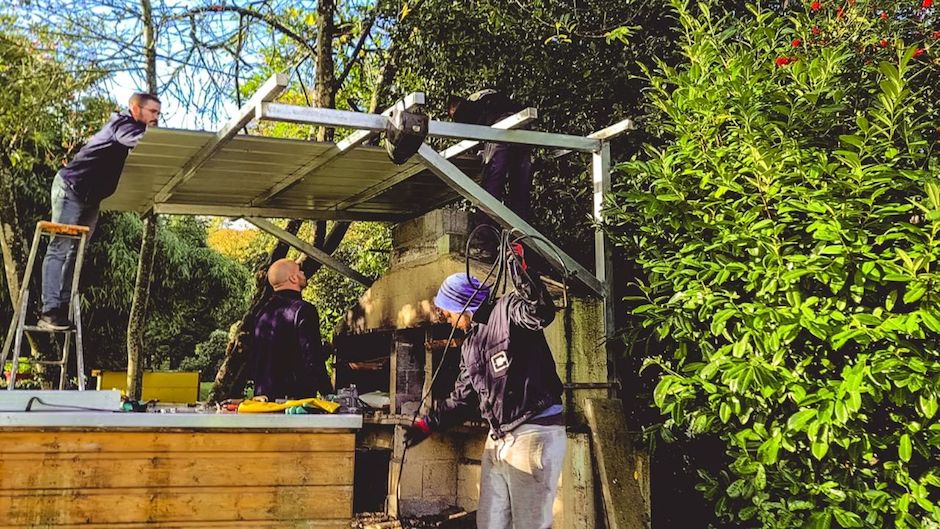 The project started in 2018 and has carried out work in Portugal, France and Spain. / Industrials for Christ
The project started in 2018 and has carried out work in Portugal, France and Spain. / Industrials for Christ
Shortly before the pandemic, 'Industrials for Christ' was born in Catalonia, Spain, a ministerial project that seeks to respond to the needs and limitations that many Christian entities and organisations have to make renovations and adaptations to their facilities.
Despite the health and social limitations caused by the impact of Covid-19, this ministry has made two trips to other countries and has also worked on projects at a national level.
They present the project as a dynamic space where people can learn a profession and develop gifts, as well as serve and, above all, get to know Christ.
Spanish news website Protestante Digital talked to three of its leaders, Oriol López, Anna Ruiz and Ester Marín.
Question: How did the idea of creating 'Industrials for Christ' come about?
Anna Ruiz: 'Industrials for Christ' was born in 2018. We went on a holiday trip to Portugal and visited a place where they held camps for children and young people. There we saw that the facilities were damaged and we felt the need to help modify and expand them.
From there, we got together with family and friends who work in the industrial and construction sector, and decided to make a trip to Portugal with friends, co-workers and even non-believers who wanted to join us, to help them.
We built a ramp for wheelchair users, we did some basic construction work, such as handrails among other things, and from then on we thought that this could be a way of serving others. That's how the project was born, thinking of serving others with our hands.
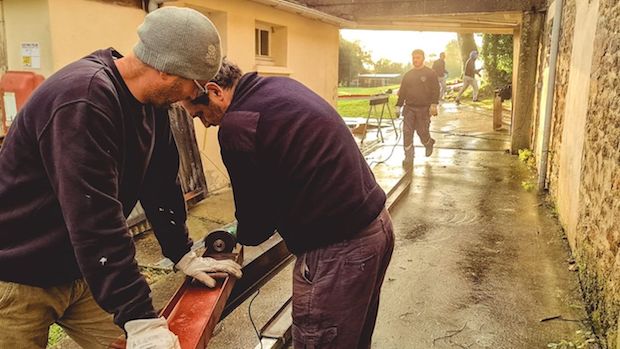
Q: What are your goals for the project?
Oriol López: The main goal of 'Industrials for Christ' is to be able to help Christian entities, that have a specific need. We know these entities and we know that they mostly live on donations and, sometimes, they cannot carry out certain reforms that they need to do. We want to help if it is within the parameters that we can assume. We study each proposal on a case-by-case basis.
Above all, we serve Christian entities, but we do not particularly focus on local churches, because we understand, from the Word of God, that the responsibility for the maintenance of a local church lies with the church itself and the brothers and sisters who form it.
We also aim to open doors for the development of gifts and professions. We do not only want to benefit the organisation that receives our help, but also the team itself. We are certainly not all industry workers. I am a computer scientist, but I have learned to do things I wouldn't have done in an office, like welding railings or cutting with radial saws. And like me, a lot of other people have learned new things that may be useful in the future.
We have met non-believers who have come with the desire to experience what it is like to help others. We use that experience to help them see a Christian witness and to preach the gospel to them. Every morning, before we start work, we have devotionals. It is our opportunity for these people to hear from the Word of God and receive the threefold purpose of the organisation: to learn a profession, to help others and, hopefully, to know Christ as their personal Saviour.
Q: How would you describe the character of 'Industrials for Christ'?
A. A.: One of the aspects that define the ministerial character of the organisation is that we invite non-believing family members, friends and co-workers. Another would be to try to do projects where finances are not an issue. For example, in our trips we try to minimise costs as much as possible so that the important thing is not the money, but the fact of coming, being together, sharing the Word and serving others.
Ester Marín: The devotionals are adapted according to the people who have come on each trip. For example, for groups where there were only believers, the focus has been more on believers. But when non-believers have accompanied us, then the devotional has been used to preach the gospel. We also try to promote a lot of fellowship among the team. The idea is that non-believers see that the fellowship and the atmosphere we Christians share is something they also need.
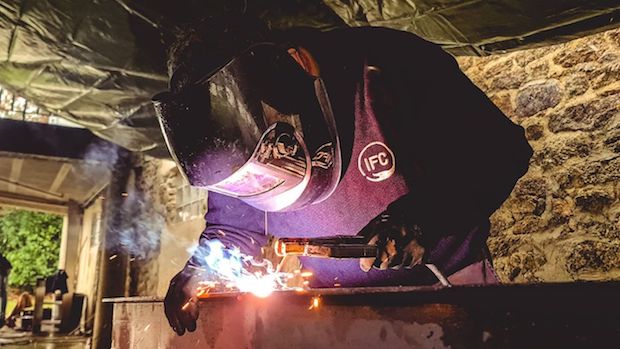
[photo_footer] The ministry mainly focuses on facilities of Christian organisations and entities. / Industrials for Christ. [/photo_footer]
Q: Who and what is behind 'Inforchrist'?
E. M.: The team consists of seven people. Of these, only three come from industry and construction. The rest of us are professionals from other sectors.
The organisations are the ones who contact us and explain to us the work they would like to do. We have to take into account what materials they have and what their budget is. We then meet and assess the work to be done and whether we are capable of carrying it out with the equipment we have.
We also consider whether, in addition to what we can do ourselves, outside help from other professionals will be needed. Our motto has always been that things must be done with dignity and excellence. We can't just do a job in any old way, because that's what it's good for.
We do not receive any external help at the moment. We pay for our own travel and we have always worked to ensure that no one is left out of a trip for this reason. If we can help to cover the entire trip, we do. We would like to have offerings only to help pay for the trip for people who cannot afford it, or to buy materials and tools. The only thing we ask of the organisations we help is that they pay for our stay in the place we are going to.
A. A.: Ultimately, it's a matter of reaching a consensus. In the last project we did, we needed a bull lift. And we don't have one. But a member of the organisation we helped did have one because he works in construction.
It's all about meeting the needs together. We have our basic tools, but no heavy machinery. If we all contribute together (the organisation, 'Industrials for Christ' and possible external help) we can supply the necessary machinery that will be used.
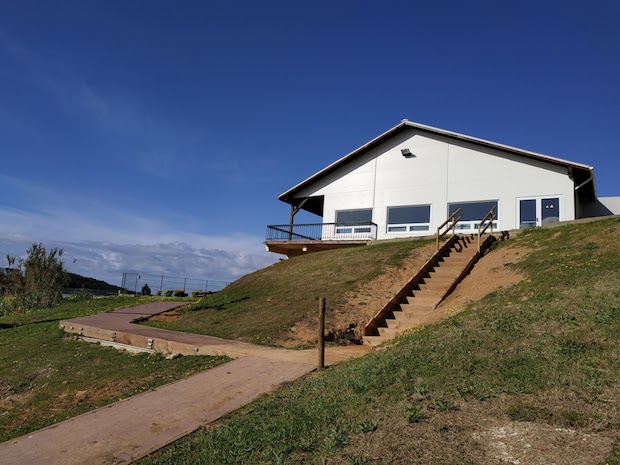
[photo_footer]So far, the team has worked on projects in Portugal and France, as well as Spain.. / Industrials for Christ. [/photo_footer]
Q: What are the main projects you have worked on so far?
A. A.: The most special was the first one, in Portugal, that also led to the creation of this ministry. There we did everything from handrails for the swimming pool, to an access ramp for the people with disabilities, external stairs, painting, the construction of an entire barbecue and a car parking area.
Another big project we did was in Dinan, in Brittany, France. There we installed a barbecue, plasterboard ceilings, worked on the electrical installation as well as painting and plumbing. We also made another ramp for disabled access. We had to make several trips of between five and six days.
Q: What are your main challenges in the short term?
O. L.: Our biggest challenge is always constancy. We have experienced perhaps the most complicated period in years, which has been the pandemic. Overcoming that time has been a challenge, because it is difficult to keep up a ministry that depends on going to places and helping while confined. It's been a couple of years since the start of the pandemic and we are still going on, doing work.
We also want to finish all the projects we started. Although there are sometimes delays, the last thing we want is to leave the work half done.
Another challenge we do have is to have more opportunities in Spain, because when it is a national project, the only big cost is fuel, and that leads to more people joining the project and coming to help and perhaps getting to know the Lord through the time we spend together.
E. M.: We are excited about the fact that we are known in Spain and that they take us into account for whatever is needed. We want to help here.
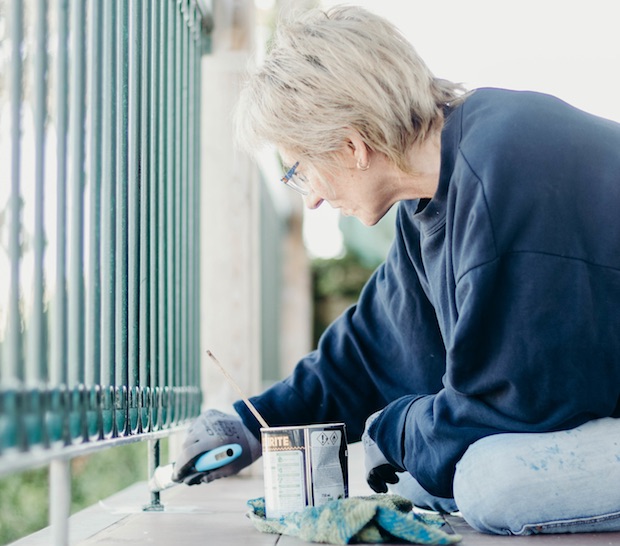
[photo_footer]The trips organised by the ministry are open to people from different backgrounds, believers and non-believers, and there are also times of fellowship. . / Industrials for Christ. [/photo_footer]
Q: How is your relationship with the local church?
O. L.: All of us are members of a local church, so we understand the importance of it and it is a major thing for us. We have presented the project in some churches that have invited us to do so. We like not only to present the project, but to encourage the church that if there is a brother or sister who has the desire to collaborate, let them come now.
Furthermore, if someone comes to know the Lord through this ministry, our intention is always to connect that person with the nearest church. We have already had the experience of someone we can now call a 'brother in Christ' who has come to know the Lord through Industrials for Christ, and we have put him in contact with a local church close to him.
E. M.: On the trips we always say that we bless and are blessed. We leave very rewarded because we are able to encourage some entity to do something, and support them.
Q: How do you claim the ministerial character of the project?
E. M.:Do what you know to do and what you can learn. You serve God with what you know to do. For some people this is their profession and they spend eight hours a day from Monday to Friday. If they can also do it for the Lord at other times of the week, it is very rewarding. This is the basis and essence of what we do at Industrials for Christ.
O. L.: The vision is different depending on the person who comes. If the person who is coming does not know Christ, we focus on making sure that the most important thing that can happen to them is to know Christ, which is what is going to save their eternal life. With those who already know Christ we work to help them develop skills and feel useful.
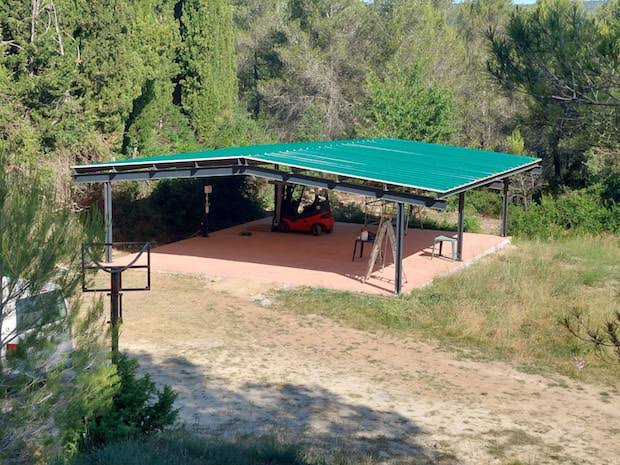
[photo_footer]The ministry is independently run and supported, and the donations received are used to help pay for the travel of some of the staff who are unable to travel, and for the purchase of materials and tools. / Industrials for Christ. [/photo_footer]
Q: You said that contact with non-believers is intense for you. How do you interact with them?
A. A.: Most of the non-believers who have participated in our trips are friends, work colleagues and people with whom we have a daily relationship. When they collaborate with one of our projects, we think it is another way for them to see church. They can overcome prejudices and stereotypes, and they can see normality in the way we live our faith.
We want them to see that we do it from the heart, and willingly. In fact, there are people who see something special in the team, something they don't have and want, and we invest time in building friendships and keeping in touch beyond travel so that they too can come to know Christ.
Q: What are your most urgent needs and how can we support the project?
E. M.: The first thing is prayer. God is the one who has to lead everything. We also encourage people to support the project by coming on one of our trips. Everyone has something to give. The logo of 'Industrials for Christ' is a hand. If we have hands, feet and a body to do so many things, we also have them to serve the Lord.
It is also possible to collaborate financially. No one in the team will benefit privately from the contributions. We only want to use it to help others and in the work we are going to do.
A. A.: Another possibility is to give scholarships to people, especially non-believers, who want to come and work with us but cannot do so for financial reasons. Although they are not expensive trips, there are people who cannot afford it.

Las opiniones vertidas por nuestros colaboradores se realizan a nivel personal, pudiendo coincidir o no con la postura de la dirección de Protestante Digital.
Si quieres comentar o